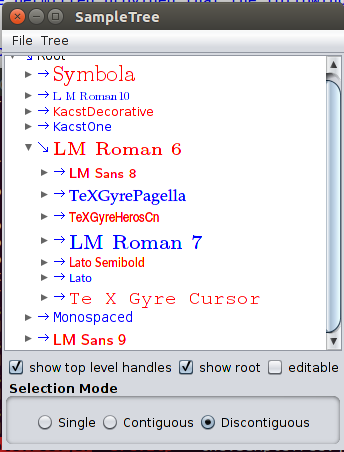Registered User mNo edit summary |
Registered User (Merge articles) |
||
| Line 1: | Line 1: | ||
<noinclude>{{ApplicableFor | <noinclude>{{ApplicableFor | ||
|MPUs list=STM32MP15x | |MPUs list=STM32MP13x,STM32MP15x | ||
|MPUs checklist=STM32MP13x, STM32MP15x | |MPUs checklist=STM32MP13x, STM32MP15x | ||
}}</noinclude> | }}</noinclude> | ||
{{Important|'''The JAVA JDK, subject of this article, is not part of STM32MPU ecosystem releases, for which ST provides some support. <br>This article only provides, as example, some helper guidelines (tips): you may need to make some adaptations depending on your system setup.'''}} | {{Important|'''The JAVA JDK, subject of this article, is not part of STM32MPU ecosystem releases, for which ST provides some support. <br>This article only provides, as example, some helper guidelines (tips): you may need to make some adaptations depending on your system setup.''' | ||
This article has been written taken as example {{Board | type=157x-DKx}} or {{Board | type=157x-EV1}} on top of {{EcosystemRelease | revision=2.0.0}} , but the recommendations, given below, could be adapted to install JAVA JDK on any other boards with STM32 MPU, populated with any STM32MPU ecosystem releases.}} | |||
The goal of this page is to describe the OpenJDK installation procedure on your STM32 MPU board and (native) desktop, in a STM32MP1 Distribution Package environment. <br> | The goal of this page is to describe the OpenJDK installation procedure on your STM32 MPU board and (native) desktop, in a STM32MP1 Distribution Package environment. <br> | ||
Revision as of 13:57, 7 June 2023
The goal of this page is to describe the OpenJDK installation procedure on your STM32 MPU board and (native) desktop, in a STM32MP1 Distribution Package environment.
It is the "Open Standard Edition Java Development Kit" installation process.
According to the OpenstLinux Weston software architecture, XWayland is used for all Java applications based on X11, which means AWT/SWING Java display/graphical applications.
By default the Java Development Kit is installed on the rootfs partition of the target.
1. Prerequisites[edit | edit source]
1.1. Hardware prerequisites[edit | edit source]
- STM32MP157x-DKx Discovery kit
 or STM32MP157x-EV1 Evaluation board
or STM32MP157x-EV1 Evaluation board 
- a keyboard and a mouse connected to the board
1.2. Software prerequisites[edit | edit source]
The STM32MP1 Distribution Package must be installed on your host. To do this, follow the procedure described in the STM32MP1 Distribution Package#Installing the OpenSTLinux distribution article.
The process has been verified with ecosystem release v2.0.0 of the OpenSTlinux distribution.
2. The yoctoproject meta-java[edit | edit source]
JAVA for Linux-based embedded systems is available as metadata in the Yocto project.
- Clone the following git repository into [your STM32MP1 Distribution path]/layers
cd [your STM32MP1 Distribution path]/layers git clone git://git.yoctoproject.org/meta-java
Depending on the Yocto release, select the right branch. (for example, branch dunfell for the ecosystem release v2.0.0 )
cd meta-java
git checkout remotes/origin/dunfell
You can see the list of available Yocto branches with the following command:
cd meta-java
git branch -a
master
remotes/origin/HEAD -> origin/master
remotes/origin/dora
remotes/origin/dunfell
remotes/origin/g0hl1n/jdk14
remotes/origin/krogoth
remotes/origin/master
remotes/origin/master-next
remotes/origin/morty
remotes/origin/pyro
remotes/origin/rocko
remotes/origin/sumo
remotes/origin/thud
remotes/origin/warrior
remotes/origin/zeus
- If not already done, set up your build environment
cd [your STM32MP1 Distribution path]
source layers/meta-st/scripts/envsetup.sh
(Select for the DISTRO openstlinux-weston and for MACHINE stm32mp1)
- Add the meta layer in your Yocto environment
cd [your STM32MP1 Distribution path]/build-openstlinuxweston-stm32mp1
bitbake-layers add-layer [your STM32MP1 Distribution path]/layers/meta-java
- Define at least the following variables in your local.conf file
([your STM32MP1 Distribution path]/build-openstlinuxweston-stm32mp1/conf/local.conf)
#Possible provider: cacao-initial-native and jamvm-initial-native
PREFERRED_PROVIDER_virtual/java-initial-native = "cacao-initial-native"
#Possible provider: cacao-native and jamvm-native
PREFERRED_PROVIDER_virtual/java-native = "jamvm-native"
#Optional since there is only one provider for now
PREFERRED_PROVIDER_virtual/javac-native = "ecj-bootstrap-native"
- Include in your image the openjdk-8 component
cd [your STM32MP1 Distribution path]/meta-st/meta-st-openstlinux/recipes-st/images
- Edit the file st-image-weston.bb and add the following line under CORE_IMAGE_EXTRA_INSTALL
openjdk-8 \
openjdk-8-demo \
- Increase the Rootfs partition size
Update the file ([your STM32MP1 Distribution path]/ layers/meta-st/meta-st-stm32mp/conf/machine/include/st-machine-common-stm32mp.inc)
IMAGE_ROOTFS_MAXSIZE = "819200"
- Build the image
cd [your STM32MP1 Distribution path]/build-openstlinuxweston-stm32mp1
bitbake st-image-weston
3. Compilation and execution of some JAVA demos[edit | edit source]
- forkjoin benchmark Java application
cd /usr/lib/jvm/openjdk-8/sample/forkjoin/mergesort
javac MergeDemo.java
java MergeDemo 200 100 3 1 1 3
Running with parameters: 200 100 3 1 1 3
Time in milliseconds. Y-axis: number of elements. X-axis parallelism used.
1 2 3
200: 10 7 8
300: 17 12 12
400: 20 14 14
Total: 47 33 34
- SampleTree Java application
Read the README.txt file for details. To execute in a Linux Weston console on the board, with a keyboard and a mouse.
cd /usr/lib/jvm/openjdk-8/demo/jfc/SampleTree
java -jar SampleTree.jar
